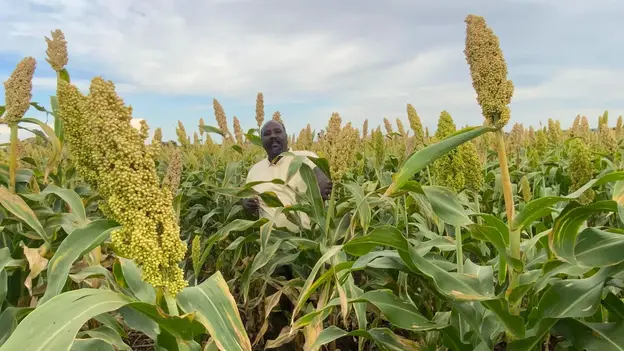Research Mobility Project
Enhancing Drought Tolerance in Sorghum Cultivars
Field Trial & Laboratory Study
AGYA member Dr. Tilal Sayed Abdelhalim conducts research about the genetic diversity of wild sorghum crops at the Gadaref Research Station in Gadaref State, Sudan. The Gadaref region is located in East Sudan and known for its agricultural productivity. The main goal of the project is to exploit genetic diversity among Sudanese wild sorghum germplasm and to develop climate-resilient sorghum cultivars that can survive drought stress unscathed. The project enables him to conduct research in cooperation with the Swedish University of Agricultural Sciences (SLU), where the sorghum samples are analysed. Providing a cost-effective solution to increase the resilience of crop plants, this approach presents an opportunity for smallholder farmers to address the challenges posed by climate change in Sudan.
Climate change is a reality in today’s world. Along with the unprecedented growth in the world’s population, underscores a looming food security issue.
How does your research contribute to food security and innovative agricultural practices?
Tilal Sayed Abdelhalim: The Gadaref State is one of the main regions in Sudan where the native Sudanese sorghum is cultivated. Together with my team, I want to identify genotypes of wild sorghum relatives that have strong “stay green” traits and, therefore, developing high levels of drought tolerance. In cooperation with SLU, we successfully identified and validated genotypes of wild sorghum crops linked to drought resilience using advanced molecular techniques and bioinformatics analysis. The knowledge of the gene code of the wild sorghum plants can then be utilized for advancing sorghum breeding to mitigating climate change adversities. The overall aim is to adopt a multi-sectoral approach to decrease food insecurity and malnutrition by increasing the quantity and quality of accessible food like native crop plants such as sorghum.
Unlocking the repository of genetic diversity of Sudanese sorghum´s wild relatives to increase the resilience of this important crop was the main focus of this project. What was most challenging?
Tilal Sayed Abdelhalim: Efforts to capture stay-green and drought-tolerant genes from the Sudanese wild sorghum’s germplasm are complicated by various challenges. Wild sorghum populations may exhibit extensive genetic variability, making it challenging to capture and characterize the full spectrum of genetic diversity.
With this RMP project, we identified 11 genotypes of wild sorghum relatives with strong ‘stay-green’ traits. Therefore, we are able to exploit the enormous potential for new sources of drought tolerance in crops.
The sheer diversity in traits among wild sorghum plants can complicate the identification of key genetic markers or patterns associated with specific characteristics, such as resistance to environmental stress. Another challenge is the difficulty in obtaining and maintaining representative samples of wild sorghum plants. These plants often grow in remote or inaccessible locations, and their collection may require specialized skills and resources. Ensuring the accuracy and reliability of genetic data from these samples can be a logistical and technical hurdle.
Did you engage in interdisciplinary or transdisciplinary encounters during your research stay?
Tilal Sayed Abdelhalim: Definitely! The project brought together various researchers from different fields, such as bioinformatics, plant physiology, plant biology, and genomics. For instance, my AGYA colleague Prof. Dr. Lilia Romdhane from the Pasteur Institute of Tunis, University of Carthage, Tunisia, conducts the bioinformatic analysis to align the samples from the field with genomic data.
In Agronomy, trans-disciplinary community work is crucial for the successful adaption of agricultural innovation. To implement new plant varieties, a cooperation with small and large-scale farmers as well as producers and consumers is necessary. Therefore, I always work together with various stakeholders and communities.
- Disciplines Involved
- Bioinformatics, Plant Physiology, Plant Biology, Agronomy
- Hosting Institution
- Gadaref Research Station, Agriculture Research Corporation (ARC), Gadaref State, Sudan
- Project Title
- Unlocking the Repository of Genetic Diversity of Sudanese Sorghum´s Wild Relatives and Their Efficient Utilization in Climate-resilient Sorghum Pre-breeding
- Year
- 2023 - 2024
- Funding Scheme
- Research Mobility Project
- Countries Involved
- Sudan, Sweden, Tunisia

